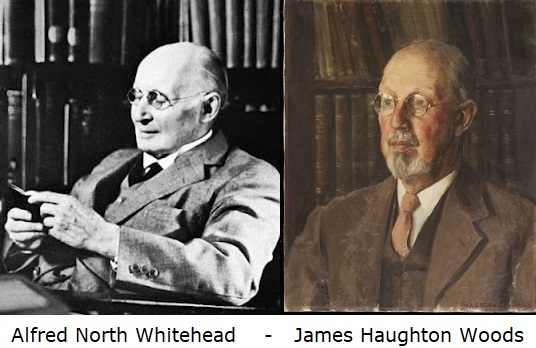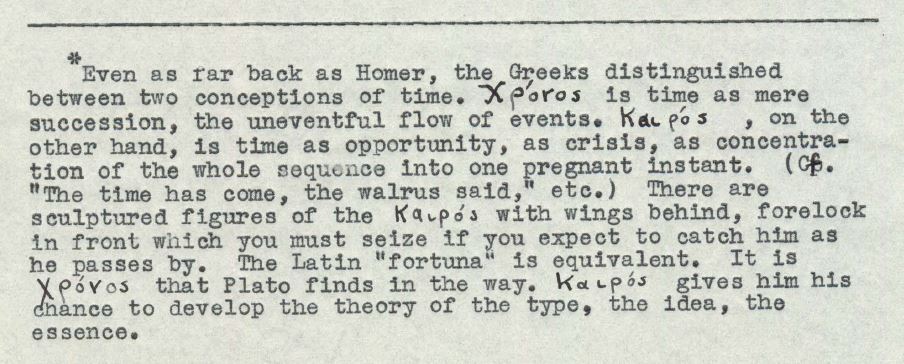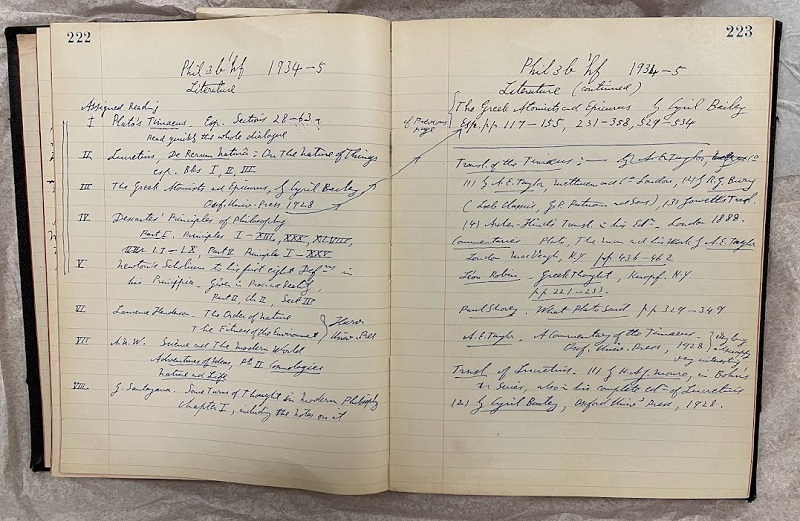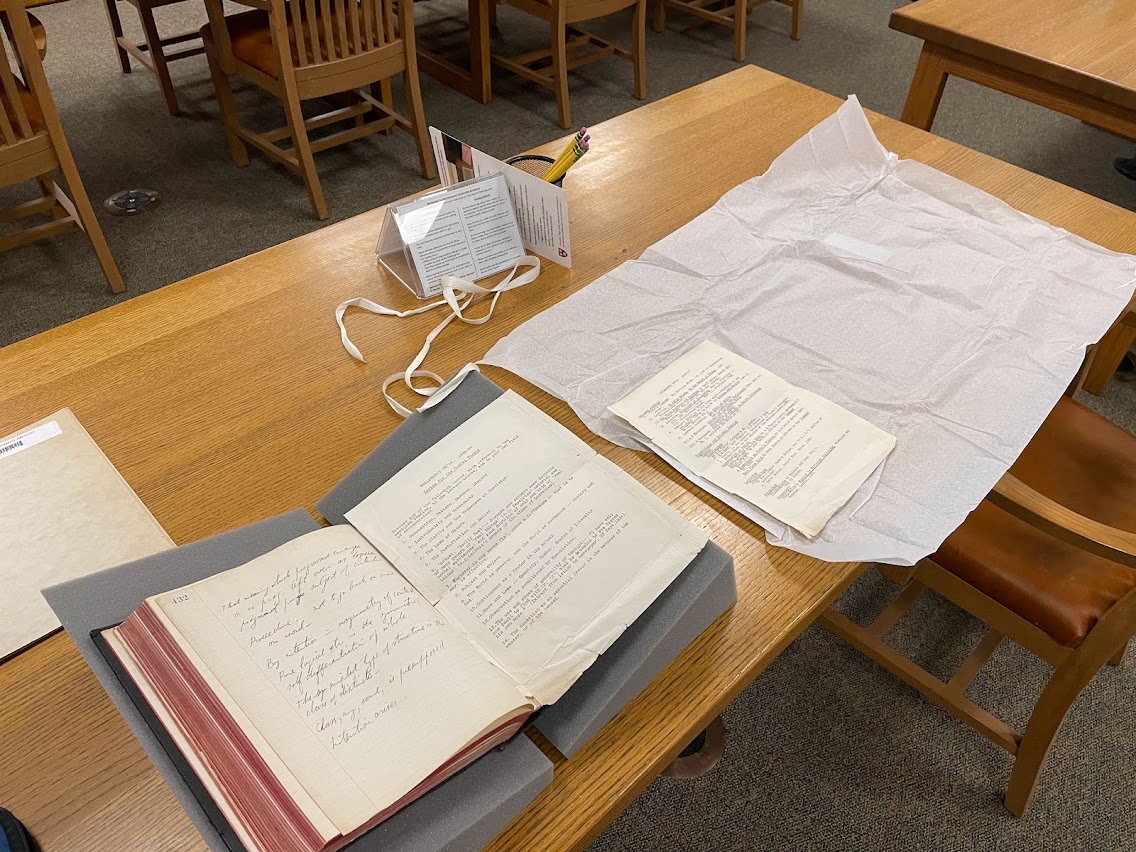STUDENT NOTES FROM WHITEHEADS’ LECTURES ON PLATO’S FORERUNNERS
1934
complited by
Harvard Professor of the Philosophical Systems of India

II. The Beginnings of Philosophy
III. The Milesian School
IV. The Pythagoreans
- The Beginnings of Philosophy
For both the Olympian and the Dionysian there is unwillingness to accept life as it is; there is a sense that physical circumstances can and must be conquered. This is a general human impulse, differentiating man from the animals.
The lower you go in the scale of human life, the more the individual is emphasized. In Homer as in any good savage there is a naive stress on single animal emotions; your Ajax is simply the aggressive expression of the desire for plenty of fighting. The satisfaction of certain instincts, the continuation of certain enjoyments (food, fighting, sex, etc.), the assertion of the will to live and the claim of a right to joy – that is about as far as he gets. (Buddhism too emphasizes the importance of the individual life, but negatively, seeking cessation of evils rather than the positive increase of single goods.) In development the ends are generalized, and the relationships between them recognized. Physical sufferings become moral sufferings, and the conflict of desires is solved by the discovery of a more inclusive and more permanent goal.
This is a gradual process, out quite early in his history man begins to realize that he cannot permanently be satisfied with a fragmentary existence, or live furiously in the present forever. He seeks linkages between various points in his experience, and attempts to make provisional arrangements with his past or future. He expands his personality beyond the present through boasting, or tries to retain portions of the past in memories caught up artificially, retained and prolonged in the stream. He believes in charms and incantations. He makes contracts, calling Zeus to witness; Zeus is then physically bound to punish the contract-breaker. (Here Zeus for the first time supplements his role of sky-god with moral functions.) For the word once uttered is charged with power. It is a living, active entity, not a mere conventional sign. It is bound up with the material universe and the soul of the speaker. The speaker belongs to his word. At the same time he is liberated by it. The word is a spiritual projectile, taking him out of the moment, putting him in touch with eternal elements in the universe. The Greek was always seeking these eternal objects. He was not content as we are with receiving the dried accumulated experience of the past, collecting mere instances, the furniture of life. He felt the importance of individual judgment, of selection and rejection, as functions almost divine. He seemed to be dividing the universe in two every time he spoke, and in a critical situation to be partaking in the permanent living fabric of things. In this way the triviality and commonness of life disappear.
The search for permanence leads finally to art and philosophy. Both are forms of 
means of escape from the tyranny of the moment. Art seeks what is worth isolating in emotion, purging away the superfluous and leaving only what is fit to endure. Philosophy looks for conceptual relations, permanent things which can recur, exemplified (though never fully existing) in the transitory objects observed by the senses. The Greeks made no such rigid distinctions as we do. 
is a term for general research, seeking in aesthetic or religious insight liberation from the unsatisfactoriness of disconnected, transient experiences. An even more inclusive term is ![]()
, which covered every sort of Intellectual investigation.
Philosophy arose rather from the Olympian than from the Dionysian way of thinking. For the Dionysian time is at the core; they are interested more in futures than in permanence. But for the Olympian, whose gods are timeless and deathless beings, each standing for a great cosmic function, time becomes irrelevant. Later Plato found time a problem*. For him the ideas take the place of the gods, being imperturbable through all the change of the world. Plato distrusts impermanence. His point of departure is his dissatisfaction with the transitoriness of the sense world. He sought a measure of standard for determining the relative importance of stimuli, and considered this to be real rather than the stimuli themselves. For Plato the essence and virtue of man is his insight into the permanence of things, and the soul is immortal in so far as it discerns eternity.

The question “Is there anything that does not change?” was a great philosophical discovery. It was, in fact, the beginning of philosophy. There were other problems, more or less allied, that also bothered the Greeks; problems of relation between parts of a changing series, for example. The Greek was an unequalled observer; the world to him was a 
, a spectacle or pageant wholly objective passing before him. The contrasts he observed were puzzling to him. How was it that the wine was both sweet and bitter? How explain the rapid changes of weather from hot to cold, from wet to dry? How could the hard limestone become soft alluvial soil? Evaporation was an amazing process, with the water always rising or falling between its banks. And cooking, with steam pouring into the air. The process of disintegration was equally interesting and equally astonishing. Then there was the problem of origins. The gods like men are tenants, not creators; what do they come from? This is not a query about the beginning or end of things in time. The idea of creation did not Interest the Greeks as it did the Hindus. They were concerned not with sequence so much as with structure, and asked not “what started things?” but “what makes things go?”, “what explains behavior?”, “what keeps everything in place and holds things together?” They sought to understand the fundamental constitution of the universe. This they expressed by the conception of  a conception older than Thales, common to all Greek philosophy, and used throughout its history with ambiguous meanings. Aeschylus meant by it hardly more than the general appearance of a thing. Hippocrates** a physician, used it to mean a man’s constitution, the proportion or structure of his elements taken as a whole. Herodotus describes the
a conception older than Thales, common to all Greek philosophy, and used throughout its history with ambiguous meanings. Aeschylus meant by it hardly more than the general appearance of a thing. Hippocrates** a physician, used it to mean a man’s constitution, the proportion or structure of his elements taken as a whole. Herodotus describes the  of a land, a river, wheat, etc.; it is here a general term for the totality of all characteristics. For Aristotle the way a river behaves is its
of a land, a river, wheat, etc.; it is here a general term for the totality of all characteristics. For Aristotle the way a river behaves is its  the permanent structure distinguished from the merely individual. For Plato it is sometimes equivalent to
the permanent structure distinguished from the merely individual. For Plato it is sometimes equivalent to 
Cicero translated it as “natura’’, and Lucretius’ “De Rerum Natura” is simply a Latinized form of the title ” 
But “nature” as we use the word is too vague a term.
Two of these meanings are of great importance for philosophy. The 
is the primary source of all things – a single living matter which makes things grow by virtue of the fact that it is itself alive. But in spite of Aristotle’s remarks on Thales, it is not to be thought of as a material cause: it is simply the ground of process.

The conception is animistic. Matter and mind are not distinguished. Cnange is dependent on a soul. Aside from this temporal aspect, the 
is the constant underlying basis of everything that exists. It is not what creates the rose, but what makes it a rose that is in question.
 is the unchangeable nature or character which is constant through all the phases of growth. Thus arises for the first time a distinction between reality and appearance. That to which all things owe their birth, growth, and death is not itself dependent. That which makes process possible is not itself a process.
is the unchangeable nature or character which is constant through all the phases of growth. Thus arises for the first time a distinction between reality and appearance. That to which all things owe their birth, growth, and death is not itself dependent. That which makes process possible is not itself a process.

is also that which guarantees the maintenance of structure in the universe. It sets limits to the contrasts, which are its aspects. Through it all things have their places, their normal functioning. It is the chart by which the behavior of gods and men must be regulated. The gods are the expressions of the

, They are parts of nature limited in their power, each having his particular domain and task. In the same way men are limited, and ’’know thyself” means “know your place.” In the Greek universe everything is on speaking terms. Everything partakes in the

, everything is growing, everything affects everything else. Human passions, desires, intelligence are attributed to all objects. The sun is moral; he knows nis limits, and keeps within them. If he were off his course, I should know it; he knows when I am. The Erinnyes are a sort of cosmical police force, expressing the compulsion behind and in everything which Keeps the world in order.
This animistic strain runs through all Greek philosophy except for Democritus and his school; and 
interests them all. The Pre-Socratics were concerned with the physical and mechanical side of growth; but physical and mechanical did not mean for them non-living. With Socrates, according to Nietzsche, came the fall of man, through the introduction of definitions and logic and teleology. But Socrates was dealing with the same problem on new ground; he was asking the question “what is the human  ?”
?”
STUDENT NOTES FROM WHITEHEADS’ LECTURES ON PLATO’S FORERUNNERS
II. The Beginnings of Philosophy
III. The Milesian School
IV. The Pythagoreans

